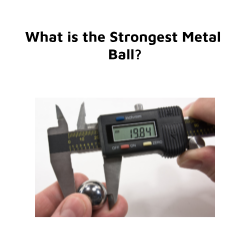
 Home > News
Home > NewsWhen it comes to metal balls used in a variety of industries—whether for bearings, industrial machinery, or aerospace applications—strength is a key factor that determines the ball’s performance, durability, and suitability for high-stress environments. The question of which metal ball is the strongest depends on how we define strength, as there are different properties that contribute to overall performance, including hardness, tensile strength, and resistance to wear and impact.

Several metals are known for their superior strength, and among these, we find some common contenders for the strongest metal balls:
Tungsten Carbide BallsTungsten carbide balls are renowned for their extreme hardness and wear resistance. Composed of tungsten and carbon, these balls have a hardness close to diamond, making them highly resistant to deformation and capable of withstanding extremely high pressure and temperatures. With a compressive strength exceeding 6,000 MPa (megapascals), tungsten carbide balls are often used in industries requiring toughness and precision, such as mining, drilling, and ball bearings. They are less ductile than other materials, but their hardness makes them ideal for applications where wear is a critical factor.
Chrome Steel BallsChrome steel balls, specifically those made of AISI 52100 steel, are widely used in bearings and have high tensile strength, which makes them incredibly durable under heavy loads. With hardness ratings between 60 and 67 HRC (Rockwell Hardness), chrome steel balls combine hardness, toughness, and fatigue resistance. These balls are a common choice in high-performance bearings, automotive applications, and even aerospace components due to their balance of strength and cost-effectiveness.
S2 Tool Steel BallsS2 tool steel is known for its exceptional impact resistance and toughness. This makes S2 tool steel balls some of the strongest in terms of withstanding repeated impact and shock loads. With high hardness levels after heat treatment and superior wear resistance, S2 tool steel balls are often used in industries like mining, construction, and heavy machinery, where impact strength is critical. These balls maintain their integrity even under highly abrasive conditions.
Martensitic Stainless Steel BallsMartensitic stainless steel, particularly grades like 440C, offers a strong balance between corrosion resistance and hardness. After heat treatment, 440C stainless steel balls can achieve hardness levels up to 60 HRC, making them suitable for high-stress environments while also providing corrosion resistance. While not the hardest metal ball, their combination of strength and corrosion resistance is highly valued in industries like aerospace, automotive, and chemical processing.
Titanium Alloy BallsTitanium is known for its high strength-to-weight ratio, making titanium alloy balls incredibly strong while being much lighter than other metals like steel or tungsten carbide. Titanium alloy balls, particularly those made of Grade 5 (Ti-6Al-4V), exhibit excellent strength, toughness, and corrosion resistance. While titanium is not as hard as tungsten carbide or chrome steel, it offers a unique advantage in applications where weight is a concern, such as in aerospace and medical devices.
When evaluating the "strongest" metal ball, tungsten carbide stands out as the hardest and most wear-resistant material, particularly in applications requiring extreme durability and resistance to deformation. However, if impact strength and toughness are the primary concern, S2 tool steel balls would be the strongest option due to their remarkable resistance to shock and wear under high-stress conditions.
For applications requiring both strength and corrosion resistance, martensitic stainless steel balls provide a robust solution, while titanium alloy balls excel where weight savings are critical. Ultimately, the "strongest" metal ball depends on the specific demands of the application, including hardness, impact resistance, tensile strength, and environmental conditions.
The strength of a metal ball is determined by various factors, including hardness, tensile strength, and resistance to wear and impact. Tungsten carbide balls are among the hardest and most wear-resistant, making them ideal for high-stress industrial applications. S2 tool steel balls, on the other hand, are the strongest when impact resistance is crucial. Depending on the specific needs of the application, different metals offer distinct advantages in terms of strength and durability, making it essential to select the right material for optimal performance.
View More(Total0)Comment Lists